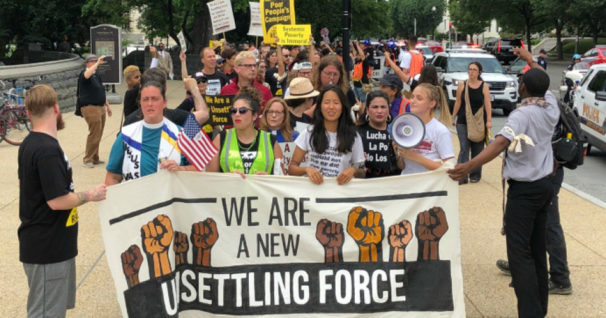
WASHINGTON—“What kind of America will we be?” That’s the question the Revs. William Barber and Liz Theoharis and tens of thousands of people, converging on the Nation’s Capital by bus, plane and subway on June 22, posed in their mass encampment on the Mall and their march from there to the foot of the U.S. Capitol steps.
The poor, who spoke for themselves at the mass event, brought their personal experiences about what it’s like to be poor in 2018 – no health care, living in shelters, taking minimum wage jobs – if there are jobs at all – and 250,000 Americans dying for lack of wealth every year.
And those “people of every race, creed, color and sexuality” brought data about the extent of poverty in the U.S., and its connections to systemic racism, exploitation, low wages, lack of workers’ rights, voter repression and the dominance of the war economy, Barber and Theoharis said. “We now see a war on the poor, not a war on poverty,” Barber stated.
“In the midst of unprecedented attacks on the poor, we see the New Poor People’s Campaign as the best response,” Theoharis added. That’s because it’ll keep going, for years if necessary, after the D.C. event.
They’re also going to keep bringing the cause to the public, to preachers and to politicians, both told a telephone press conference the day before. “We are committed to a long-term movement based in low-wealth and poverty counties,” Barber explained.
The NPPC is different from, and broader than, the late Dr. Martin Luther King’s Poor People’s March 50 years ago, Barber explained. For one thing, it has been in the works for three years. It’s also featured 40 days of peaceful civil disobedience, mass marches in D.C. and almost 40 state capitals.
And NPPC’s fusion of blacks, whites, Asians, Latinos and the poor has already scared politicians.
The worst case, in Kentucky, saw the right-wing GOP governor bar Barber and hundreds of Kentuckians, including white coal miners, from the state capitol building in Frankfort.
In Kansas, officials declared NPPC marchers “injured” the building. In Trenton, N.J., NPPC members were arrested before they reached their destination, and even in supposedly progressive D.C., police barred NPPC representatives from the front steps of its city hall.
And GOP President Donald Trump’s UN ambassador, former South Carolina GOP Gov. Nikki Haley, scornfully told the UN it shouldn’t even discuss poverty in the U.S. “Make America Great Again” – Trump’s campaign slogan – “seems to be policy violence,” Barber responded.
“Snatching children and putting them in cages is policy violence,” he said, referring to the Trump administration’s forced removal of kids from their parents at the U.S.-Mexico border.
“Rolling back health care protections is policy violence. Not providing a living wage is policy violence.”
Ecological devastation of poor communities and spending on militarism is policy violence, too, Barber stated. And the policy violence predates Trump, he pointedly said, adding politicians of both parties are responsible for it.
The campaign is also different because it unites blacks, whites, members of most faiths, and everyone else in the common cause, outside their “silos” of individual issues, Barber said. And it goes into so-called “red states” that progressives – and Democrats – have largely written off.
Activism in Kansas and Kentucky, and Native Americans traveling from Arizona to D.C. showed that, he added. Theoharis made the point that, contrary to stereotypes, most of the poor are white and most are women and children.

“We’re going to have mass voter mobilization and power-building among the poor,” Barber said.
The NPPC set up a camp on the Mall prior to the march on the U.S. Capitol, just as King’s legions did 50 years ago. Like then, the NPPC also has notable union support, from the Steelworkers, the Teachers (AFT), the Service Employees, AFSCME, the United Food and Commercial Workers and others. Contingents from those unions and more marched on Saturday. And the UNI global conference of unions from 131 nations, meeting in Liverpool, England on June 16, endorsed the NPPC, too.
But unlike 50 years ago, groups’ leaders did not speak, except for Barber and Theoharis. That’s because NPPC started as, and will remain, a bottom-up organizing and grass-roots drive, led by the poor themselves. And they’re the ones who talked and who delivered letters to Congress with the movement’s data and demands, the two said.
“We need to expand the narrative” and ensure eradicating poverty stays atop the nation’s agenda, Barber explained. “In 1968, even though 25 groups were part of” King’s march, “America did not listen and did not address the issues Dr. King put before us.”
Those issues, Theoharis re-emphasized, are interlocking: Systemic racism, worker exploitation, voter suppression, the war economy, ecological devastation and other policy violence.
The Republican-run Congress and Trump apparently have yet to listen. The GOP ideologues who control the U.S. House approved legislation on June 21 to cut food stamps and impose “work requirements” on recipients. Trump’s government reorganization plan, merging the departments of Labor and Education, would hurt both workers and kids, notably poor kids, Barber added.
And Trump is separating children from their parents at the U.S.-Mexico border. Theoharis noted NPPC members know past U.S. history of such forced separations of Native American parents and African-American slave parents from their kids, too.
Both Trump and Congress harmed the poor with the $1.2 trillion tax cut for the rich and corporations, the two said. Theoharis will discuss that tax cut, poverty in general and how the current administration has made it worse, at the United Nations during the week of June 25.










